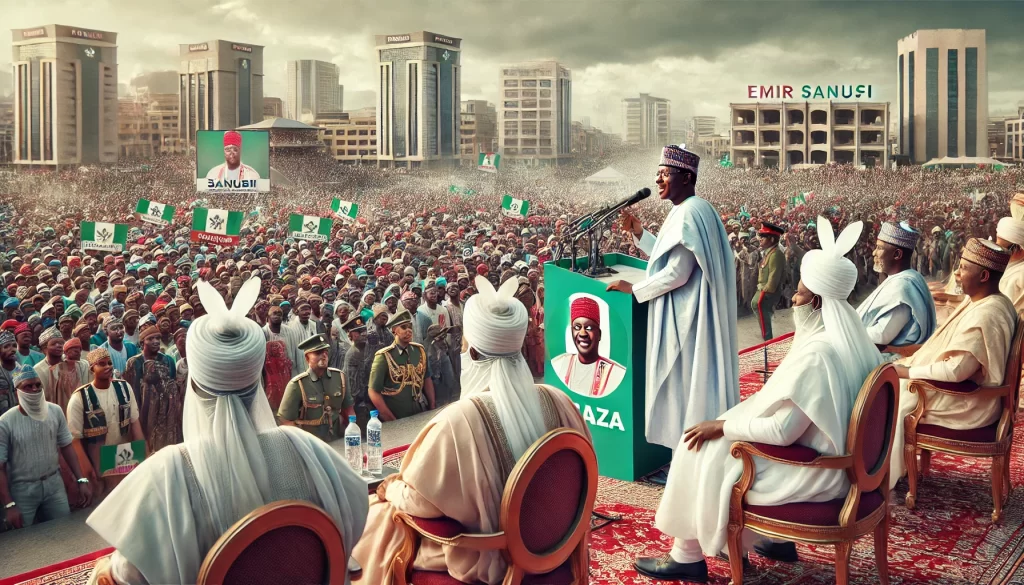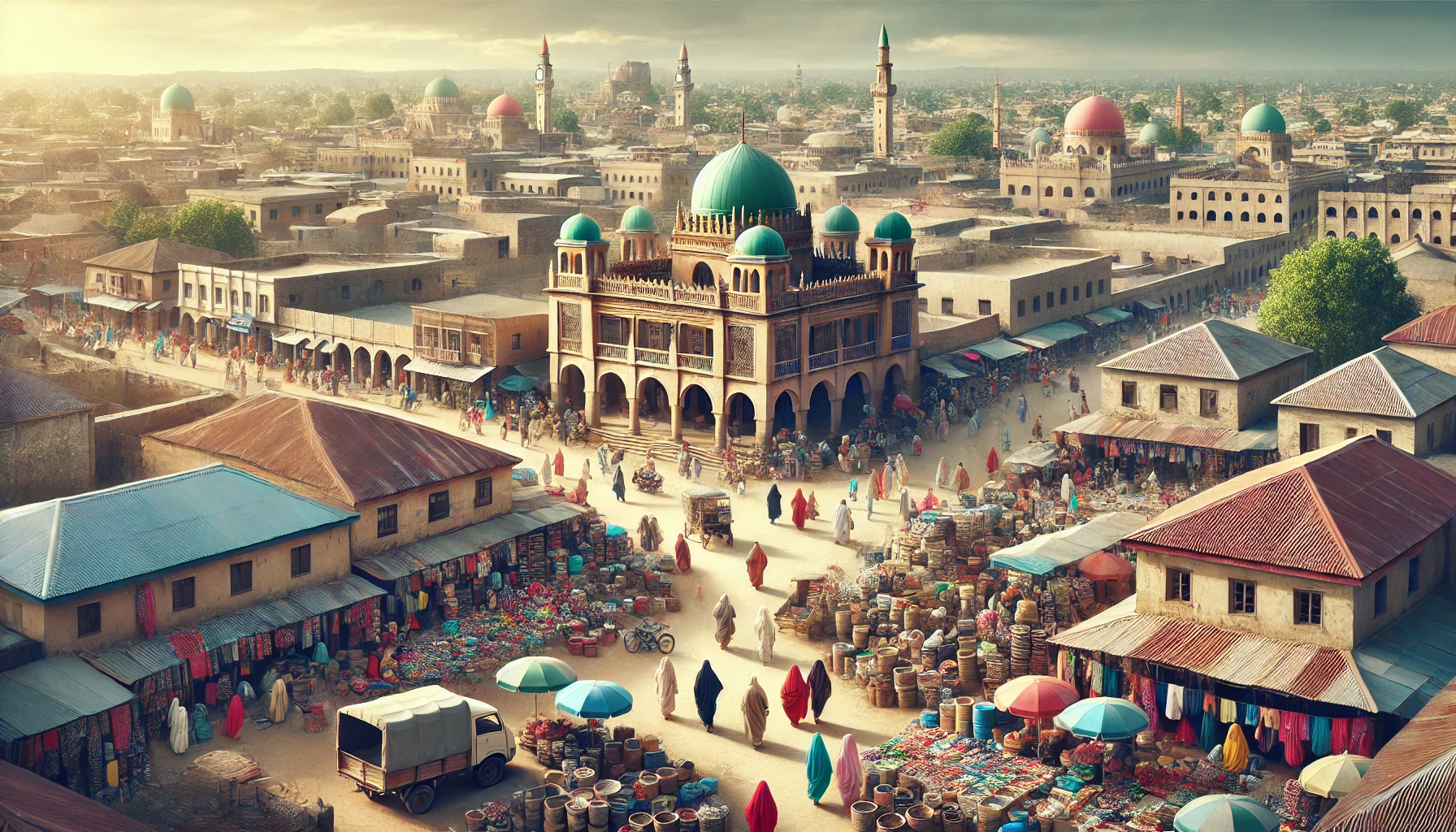In the ancient city of Kano, Nigeria, a dramatic struggle for power is unfolding between two rival kings, Emir Sanusi and Emir Aminu. Both men claim to be the rightful emir of Kano, a kingdom that dates back over a thousand years.
Background of Kano and Its Emirs
Kano is one of the oldest and most important cities in Nigeria. It has been a major center of commerce and culture for centuries. The title of Emir of Kano is very prestigious and influential. The emir traditionally serves as both a spiritual and political leader for the people in the region.
The Story of Emir Sanusi
Emir Sanusi, whose full name is Muhammadu Sanusi II, is known for his progressive ideas. He believes in modernizing the society by promoting the education of girls and supporting women’s rights. Before becoming an emir, he worked as a banker and was the governor of Nigeria’s Central Bank. In 2014, he became the emir of Kano.
Sanusi is outspoken and often criticizes politicians, which made him popular with some people but also caused him trouble. In 2020, the then-governor of Kano State, Abdullahi Ganduje, removed Sanusi from his position, accusing him of insubordination and mismanagement. Sanusi’s supporters say he was removed because he spoke out against corruption and supported the wrong political candidate.
The Rise of Emir Aminu
After Sanusi was removed, Aminu Ado Bayero, a relative of Sanusi, became the new emir. Aminu is seen as a more traditional ruler who keeps quiet and does not challenge political leaders. He moved into the palace and began his rule, supported by Governor Ganduje.

The Return of Emir Sanusi
In May 2024, the newly elected governor of Kano State, Abba Yusuf, reinstated Sanusi as the emir. This was a significant event because Sanusi had been out of power for four years. Governor Yusuf’s decision was seen as a way to fulfill his campaign promise and gain political support.
Sanusi returned to the palace with much celebration from his supporters. However, Aminu refused to step down and continued to claim that he was the rightful emir. He moved into a nearby palace annex and began a legal battle to regain his throne.
The Political Battle
The conflict between Sanusi and Aminu is not just about who gets to wear the crown. It also involves a bigger political struggle. Different politicians and government officials support different emirs to strengthen their own power and influence. Governor Yusuf supports Sanusi, while the federal government supports Aminu.
The battle for the throne of Kano has become very intense, with both emirs surrounded by their loyal supporters. The palaces are heavily guarded to prevent any violence. People in Kano are worried that the situation might lead to unrest and chaos in the city.
Why It Matters
Understanding this conflict helps us see how traditional roles and modern politics can mix in complex ways. In Nigeria, traditional leaders like emirs still have a lot of influence, even though they do not have official government powers. They can sway public opinion and play important roles in elections.
The struggle for the throne of Kano shows how deeply politics can affect even ancient traditions and how important it is to find peaceful solutions to conflicts. It also highlights the ongoing efforts to balance progress and tradition in societies around the world.
This article is based on the following articles:
https://www.nytimes.com/2024/07/03/world/africa/nigeria-kano-emir-kingdom-battle.html

Background Information
Nigeria: An Overview
Nigeria is a country located in West Africa. It is the most populous country in Africa, with over 200 million people. Nigeria is known for its diverse cultures, languages, and ethnic groups. The country is a federal republic, meaning it has a central government along with individual states that have their own governments.
Traditional Leadership in Nigeria
In addition to its elected government, Nigeria has a rich history of traditional leadership. This includes kings, chiefs, and emirs who lead different ethnic groups and regions. These traditional leaders play important cultural and spiritual roles in their communities.
The Role of Emirs
An emir is a traditional Muslim ruler. In northern Nigeria, emirs are highly respected and have significant influence over their people. The emirate system in Nigeria has been in place for centuries, and emirs often serve as both spiritual leaders and political figures.
The Emirate of Kano
Kano is one of the most important emirates in Nigeria. It is located in the northern part of the country and has a long history as a center of trade, culture, and learning. The Emir of Kano is considered one of the most senior traditional rulers in Nigeria, second only to the Sultan of Sokoto.
The Hausa and Fulani People
The Hausa and Fulani are two of the largest ethnic groups in Nigeria, primarily found in the northern regions. The Hausa are known for their rich culture and history, while the Fulani are traditionally cattle herders. The emirate system in northern Nigeria is heavily influenced by both Hausa and Fulani traditions.
The British Colonization and Its Impact
Nigeria was a British colony from the late 19th century until it gained independence in 1960. During colonization, the British used a system called “indirect rule,” which allowed traditional leaders like emirs to maintain their positions while serving the interests of the colonial government. This system strengthened the role of traditional leaders in Nigerian society.
Post-Independence Nigeria
After gaining independence, Nigeria became a federal republic. However, traditional leaders like emirs continued to hold significant cultural and social influence. Nigeria has experienced various political changes, including military coups and transitions to democratic rule. The country’s politics are complex, with numerous parties and powerful regional leaders.
The Role of Women and Education
In many parts of Nigeria, traditional views on gender roles are strong. Women often face challenges in accessing education and participating in public life. Progressive leaders like Emir Sanusi advocate for the education of girls and women’s rights, which can be controversial in conservative areas.
Corruption in Nigeria
Corruption is a major issue in Nigeria. It involves the misuse of public office for personal gain, including bribery, embezzlement, and nepotism. Corruption affects various sectors of society, including politics, business, and even traditional leadership. Efforts to combat corruption are ongoing, but the problem remains significant.
Political Parties in Nigeria
Nigeria has multiple political parties, with the two most prominent being the All Progressives Congress (APC) and the People’s Democratic Party (PDP). Political parties play a crucial role in elections and governance, often aligning with different regional and traditional leaders to gain support.
The Importance of Kano in Nigerian Politics
Kano State is one of the most populous and politically significant states in Nigeria. It plays a crucial role in national elections, and its leaders can greatly influence political outcomes. The emir of Kano, therefore, holds a position that is not only culturally important but also politically strategic.
Legal System in Nigeria
Nigeria’s legal system is based on a combination of British common law, traditional laws, and Islamic law (Sharia) in some northern states. Legal disputes, including those involving traditional leaders, can be complex and involve multiple levels of courts.
Please subscribe to Insight Fortnight, our biweekly newsletter!
